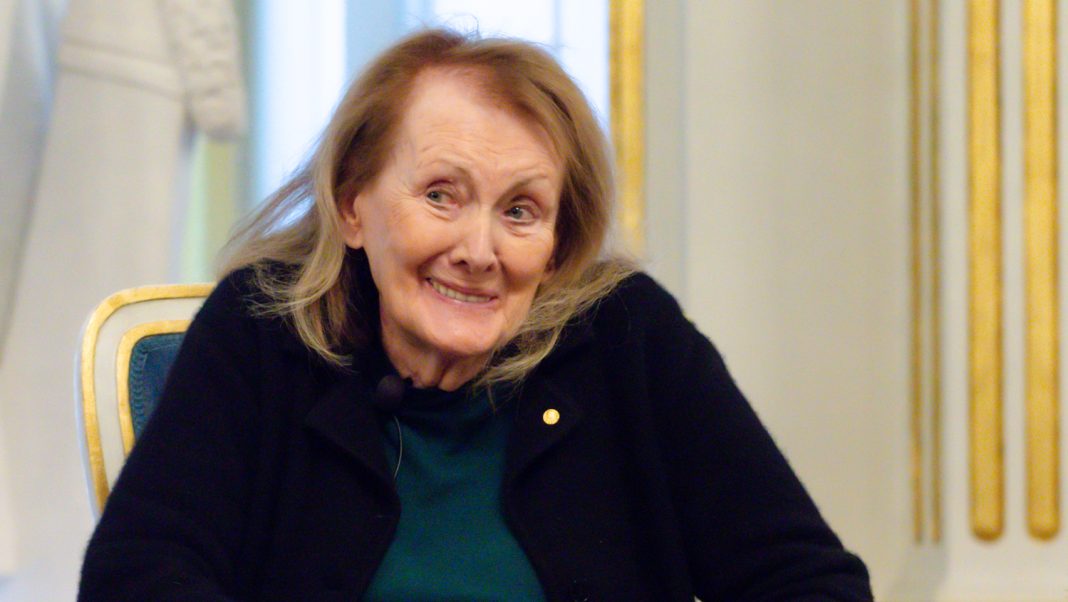My most hated subject at school was French. I mean, I hated every subject – the only thing I remember liking in all my years at school was the hour-long geography lesson we spent watching videos of erupting volcanos (lava spouting!) – but French had a special place in my list of hated things. This was partly because learning it seemed so boring. Did we really need to know how to buy an umbrella, or how to help Simon find the bus stop, and couldn’t we do something more interesting, like watch a French film and drink red wine? But there were also the usual Anglocentric reasons. I didn’t see why I, an English-speaking person, should have to learn a foreign language, when out in the big wide world everyone else would have to speak English just like me. On the morning of my French GCSE, I slipped out of the school gates and went to the park to smoke weed. Needless to say, my results weren’t good.
Little did I know at the time, I had many things in common with Annie Ernaux, the French author who won the Nobel Prize for Literature in 2022 (the first French woman to do so: fifteen French men had been nobelised before her). Not that I’ve won the Nobel Prize (I’ve never even been nominated). Nor am I French, a woman, or born in the 1940s. And for that matter, Ernaux didn’t even hate school. But one of the major themes of her writing is the tension between the world she was born into – that of provincial, rural France, where most people spent their lives working on the family farm and where living room floors were made of bare soil – and the one she climbed her way into, that of the university-educated intellectual elite whose books were published by Gallimard. One of Ernaux’s obsessions is the way that ‘provincials’ felt disdained by what we would now call the metropolitan liberal elite, and how they disdained those elites in return. Town versus county, intellectuals versus the ‘uncultivated’, those who quote Shakespeare versus those who don’t – all these oppositions are present in much of Ernaux’s writing. There’s a lot that I, the weed-smoking hater of anything intellectual, including learning other languages, could have identified with, had I been willing and able to read French.
Funnily enough, today I both read and love Ernaux’s books, due to the fact that I now do something that fifteen-year-old me never in a million years imagined possible: living in France. Though I come back to Oxford for term times, for the last five years my official home has been a small medieval town in southern Brittany, where I live with my French partner. But it took me a long time to really feel at home in France. Between going back to Oxford for an undergraduate degree, a masters, and now a PhD, it’s been hard to find the time to properly learn the language, let alone build up a circle of French friends. But eventually I got sick of not understanding a word anyone said to me on nights out and decided to take learning French seriously. And one of the major steps in that has been reading Ernaux’s books.
For those starting out reading French, Ernaux is a good place to begin, because her writing is so straightforward – pick up any review of her work and you’ll see her writing described as “sparse”, “clinical”, or “like cut glass”. When confronted with the scary thing called French Literature, it’s easy to feel you have to start with the intimidating classics, Proust’s three thousand pages about Madeleines, page-long run-on sentences and all. At least I did, and it’s the quickest way to confirm the feeling that your French is useless. Giving up Proust and finding Ernaux’s cut glass is a good way to realise that your level probably isn’t as bad as you think. I read La Place (1983), the short book about the death of her father that made Ernaux’s name, in a weekend. I followed this with Une Femme (1988) an equally short book about her mother’s gradual descent into dementia and then death. A lot of death to deal with at once, but Ernaux’s writing is so gripping, its impossible to put the books down once you’ve started. And I hardly had to use a dictionary.
But there’s also a political point to Ernaux’s writing. As she has spoken about at length, she never escaped the feelings of guilt that came with joining France’s intellectual elite – she describes herself as a “class defector” (“transfuge de classe”) – and both her subject matter and her style reflect this. Time and time again her writing returns to the experiences of those, including her own parents, who felt looked down upon by French social elites, and the point of her pared back style is that her parents and those like them could feel both that her books spoke to them and spoke like them. And therein lies the value of Ernaux to me. She shows that intellectualism, if that is what writing books – or, dare I say, going to Oxford – has to be called, it can be done without pretension. Maybe if I’d read her sooner, I’d have done better in my GCSEs. Or at least I’d have thought that trying to do well didn’t necessarily have to involve quoting Shakespeare.


